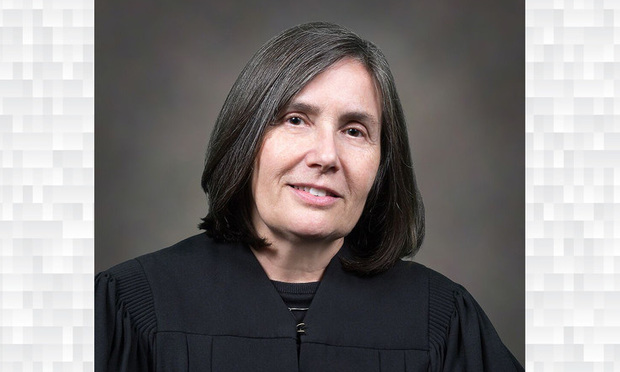Recently Retired Phila. Commerce Court Judge Heads to ADR
After nearly 25 years on the bench handling numerous high-profile cases and becoming a part of the court's leadership, McInerney is gearing up to take that expertise to JAMS where she will do private alternative dispute resolution.
August 15, 2018 at 02:47 PM
5 minute read
 Patricia McInerney.
Patricia McInerney.
When the first supervising judge of Philadelphia's Commerce Court was initially assigned to handle the city's biggest business disputes, she did not want the job.
“I was very happy doing my med mals and my products cases,” former Philadelphia Judge Patricia McInerney said during a recent interview. “But it turned out to be a very good assignment, and I very much enjoyed my time in Commerce.”
Now, after nearly 25 years on the bench handling numerous high-profile cases and becoming a part of the court's leadership, McInerney is gearing up to take that expertise to JAMS where she will do private alternative dispute resolution. She said she expects to handle a wide range of disputes, but may emphasize business issues, given her familiarity with the topic and attorneys that practice in that space.
“I'm hoping to see a lot of the lawyers I worked with in Commerce. … I'm a known quantity,” McInerney said.
McInerney was elected to the Philadelphia Court of Common Pleas in 1995, and stepped down from the bench June 30. She is planning to join JAMS in September.
Since stepping down, Judge Nina Wright Padilla has joined the Commerce Court, and Judge Gary Glazer has taken over supervising the court.
Before becoming a judge, McInerney worked as a public defender and then a civil litigator, handling employment, civil rights, premises liability and other general liability disputes. While working as a lawyer, she began participating in the First Judicial District's program that allows attorneys to act as arbitrators in cases involving less than $50,000, and then decided to run for a judgeship.
“I was in front of a lot of judges, and I just thought it was important that everyone get a fair trial and be treated fairly, and I thought I could do a good job at it,” she said.
McInerney began in the trial division, handling major criminal and civil trials. In 2011, after the death of Judge Albert W. Sheppard, she was assigned to take his place as the Commerce Court leader. Sheppard had been one of the founders of the court, and McInerney said that at first she was not enthusiastic about the post.
However, she soon found that the pace and complexity of the matters she was hearing suited her. She said she also enjoyed having an individual case calendar, so she could handle each case from start to finish, rather than handle individual motions, hearings, or trials, as often happens in the criminal and civil divisions.
“You have to be a little bit geeky to be in Commerce. There are more legal issues, and it's fun to toss those around,” she said. “You get to know the cases better, and you get to know the lawyers better.”
After taking over in the Commerce Court, McInerney has handled numerous high-profile, high-dollar-amount disputes, including fights involving law firms, a dispute about whether Pennsylvania could recoup more than $120 million in tobacco settlement funds, and legal battles involving some of Philadelphia's most well-known entities.
McInerney said one of the most memorable cases she handled involved the closely watched dispute between owners of The Philadelphia Inquirer about whether Bill Marimow, the top editor of the paper, should have been fired in 2013. McInerney ultimately determined a few months after the firing that Marimow should not have been dismissed, but the feud between various factions with ownership stakes in the company continued. The dispute ended after co-owner Lewis Katz, who had backed Marimow, bought out the other co-owners for $88 million. Katz died just days later in a plane crash.
“It was a very hotly contested case,” McInerney said. “It was very important to me at the time, because the paper means a lot to the people of Philadelphia. It was important to me that the case get resolved quickly and properly, and that the paper survive.”
In 2016, when Judge Jacqueline Allen took over as the FJD's administrative judge, McInerney was made the first supervising judge of the Commerce Court. While the change was largely in title only, McInerney said, it was also meant to reflect that the Commerce Court was a separate entity within the broader court system with its own administrative needs.
With McInerney heading Commerce Court, Allen heading the FJD as administrative judge, Judge Sheila Woods-Skipper overseeing the court as president judge, and Judge Idee Fox being tapped as supervising judge of the civil trial division, McInerney was part of a wave of women who took over court leadership in 2016.
The transition, McInerney said, was part of the major changes she's seen within the court since taking the bench.
“We've had a lot more women and people of color on the bench,” she said. “We have a long way to go in Philadelphia, but certainly, we've had really big changes.”
McInerney said there was a natural progression from serving on Commerce Court to becoming an arbitrator. While heading the court, she helped hammer out numerous settlements, and became familiar with other mediators, including retired federal magistrate Judge Diane Welsh, who, McInerney said, was a bit of a mentor and helped get her interested in ADR.
McInerney said that, whether as a judge or a litigator, she has always enjoyed being in court, but since stepping down from the bench, she has taken the summer off, spending much of it on Cape Cod.
“I've been off this summer enjoying myself,” she said. “It's the first time having the summer off since I was a kid.”
This content has been archived. It is available through our partners, LexisNexis® and Bloomberg Law.
To view this content, please continue to their sites.
Not a Lexis Subscriber?
Subscribe Now
Not a Bloomberg Law Subscriber?
Subscribe Now
NOT FOR REPRINT
© 2025 ALM Global, LLC, All Rights Reserved. Request academic re-use from www.copyright.com. All other uses, submit a request to [email protected]. For more information visit Asset & Logo Licensing.
You Might Like
View All
Superior Court Directs Western Pa. Judge to Recuse From Case Over Business Ties to Defendant
3 minute read

Kline & Specter and Bosworth Resolve Post-Settlement Fighting Ahead of Courtroom Showdown
6 minute read
Saxton & Stump Lands Newly Retired Ex-Chief Judge From Middle District of Pa.
3 minute readTrending Stories
Who Got The Work
J. Brugh Lower of Gibbons has entered an appearance for industrial equipment supplier Devco Corporation in a pending trademark infringement lawsuit. The suit, accusing the defendant of selling knock-off Graco products, was filed Dec. 18 in New Jersey District Court by Rivkin Radler on behalf of Graco Inc. and Graco Minnesota. The case, assigned to U.S. District Judge Zahid N. Quraishi, is 3:24-cv-11294, Graco Inc. et al v. Devco Corporation.
Who Got The Work
Rebecca Maller-Stein and Kent A. Yalowitz of Arnold & Porter Kaye Scholer have entered their appearances for Hanaco Venture Capital and its executives, Lior Prosor and David Frankel, in a pending securities lawsuit. The action, filed on Dec. 24 in New York Southern District Court by Zell, Aron & Co. on behalf of Goldeneye Advisors, accuses the defendants of negligently and fraudulently managing the plaintiff's $1 million investment. The case, assigned to U.S. District Judge Vernon S. Broderick, is 1:24-cv-09918, Goldeneye Advisors, LLC v. Hanaco Venture Capital, Ltd. et al.
Who Got The Work
Attorneys from A&O Shearman has stepped in as defense counsel for Toronto-Dominion Bank and other defendants in a pending securities class action. The suit, filed Dec. 11 in New York Southern District Court by Bleichmar Fonti & Auld, accuses the defendants of concealing the bank's 'pervasive' deficiencies in regards to its compliance with the Bank Secrecy Act and the quality of its anti-money laundering controls. The case, assigned to U.S. District Judge Arun Subramanian, is 1:24-cv-09445, Gonzalez v. The Toronto-Dominion Bank et al.
Who Got The Work
Crown Castle International, a Pennsylvania company providing shared communications infrastructure, has turned to Luke D. Wolf of Gordon Rees Scully Mansukhani to fend off a pending breach-of-contract lawsuit. The court action, filed Nov. 25 in Michigan Eastern District Court by Hooper Hathaway PC on behalf of The Town Residences LLC, accuses Crown Castle of failing to transfer approximately $30,000 in utility payments from T-Mobile in breach of a roof-top lease and assignment agreement. The case, assigned to U.S. District Judge Susan K. Declercq, is 2:24-cv-13131, The Town Residences LLC v. T-Mobile US, Inc. et al.
Who Got The Work
Wilfred P. Coronato and Daniel M. Schwartz of McCarter & English have stepped in as defense counsel to Electrolux Home Products Inc. in a pending product liability lawsuit. The court action, filed Nov. 26 in New York Eastern District Court by Poulos Lopiccolo PC and Nagel Rice LLP on behalf of David Stern, alleges that the defendant's refrigerators’ drawers and shelving repeatedly break and fall apart within months after purchase. The case, assigned to U.S. District Judge Joan M. Azrack, is 2:24-cv-08204, Stern v. Electrolux Home Products, Inc.
Featured Firms
Law Offices of Gary Martin Hays & Associates, P.C.
(470) 294-1674
Law Offices of Mark E. Salomone
(857) 444-6468
Smith & Hassler
(713) 739-1250





